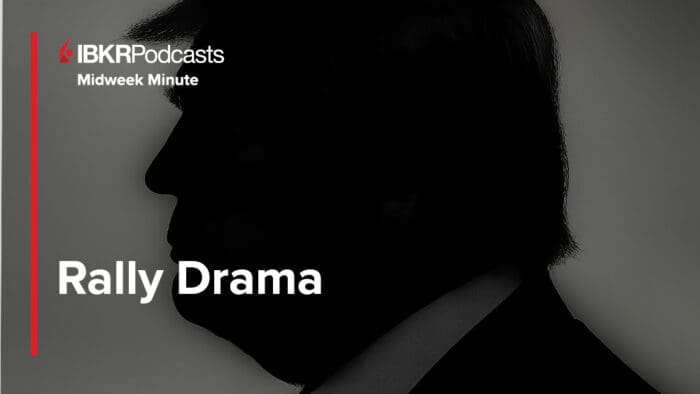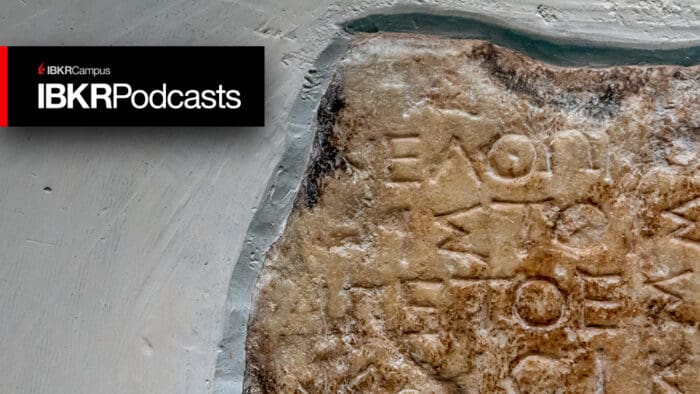Mat Cashman, Principal of Investor Education at the OCC, joins Jeff Praissman in a great conversation explaining the Option Greeks: Delta, Gamma, Theta, Rho, and Vega.
Corresponding webinar: /campus/webinars/demystifying-the-greeks-june-2024/
Summary – IBKR Podcasts Ep. 167
The following is a summary of a live audio recording and may contain errors in spelling or grammar. Although IBKR has edited for clarity no material changes have been made.
Jeff Praissman
Welcome to another episode of the IBKR podcast, where we dive deep into the world of option trading. I’m your host, Jeff Praissman, and today we have a very, special guest joining us, Matt Cashman, Principal of Investor Education at OCC. Matt is a seasoned option trader and educator with years of experience in the financial markets.
Matt, we just finished up a great webinar. Welcome back to the show.
Mat Cashman
Thank you for having me, Jeff. It’s always a pleasure to be here. I love talking about options, so I’m excited to do that again today.
Jeff Praissman
Yeah, absolutely. So, for our listeners, the webinar we just covered the option Greeks.. and Matt, they can be quite intimidating for many traders and especially people new to options. So I’m really glad that we’re able to take this deeper dive through the podcast and kind of help demystify them.
So, you ready to jump right in?
Mat Cashman
Yeah, I’m always ready to jump in, especially when we’re talking about options.
Jeff Praissman
So, let’s start with the basics. Can you give our listeners a brief overview of what the option Greeks are and why they’re important?
Mat Cashman
Yeah, absolutely. We just finished talking a lot about this. I’m glad to be able to address it again. The option Greeks, when you boil them down, are essentially risk measures that help traders understand how changes in various factors like price, time, implied volatility levels, can affect the price of the option.
So there’s really five main Greeks that people usually have on their screens, like all the time when you’re a professional options trader. Those are Delta, Gamma, Theta, Vega, and Rho.
Delta, Gamma, Theta, Vega, Rho. So those five are usually up in front of us all the time when you’re talking about pro-option traders.And those are the ones that we cover most of the time when we talk about Greeks.
Jeff Praissman
Is each of those five Greeks, do they operate independently? Let’s just say if Gamma changes, could it affect another Greek as well? So, are they interdependent or independent?
Mat Cashman
It’s a good question. And the answer to that question is kind of both. So each Greek measures a different aspect of an option’s risk. So that’s important to remember. Each Greek has its own kind of pocket of risk that it’s telling you how that option might move if things around it are moving, but they’re not completely independent.
For example, changes in implied volatility levels can sometimes reflect changes in Vega. Also, Vega changes can affect Delta and Gamma changes, depending on how much an option becomes bigger or smaller relative to its price and its amount of premium involved in it.
So the answer, it’s not a great answer, but the answer is the truth, which is sometimes they do actually cross paths and are interdependent on each other. And sometimes they’re moving independently of each other as well.
Jeff Praissman
Options can either be in the money, at the money, or out of the money. How does that, if at all, affect the Greeks?
Mat Cashman
This is an interesting part of how sometimes people can compartmentalize how these options and where they are relative to where the stock is can affect their Greeks. Now generally speaking, in the money options have a completely different characteristic and risk profile from out of the money options or at the money options.
Many times what people will find is that the at the money options are those options that are most affected by movement up and down relative to the actual underlying movement.
And so many of the Greeks are going to be concentrated around those at the money options. Things like Gamma. Gamma is something that exists very specifically in the at the money option, most prominently in that options risk profile.
So Gamma is going to be something that’s very, very concentrated in the at the money option. Changes in price and volatility can change things like deep in the money options and out of the money options as well as at the money options. But you’re going to find things like Gamma concentrated most in the at the money option.
And also there’s an element of this that exists as far as duration and time is concerned. When an option becomes a longer-term option, it generally has larger amounts of Vega in it, which means it’s more sensitive to implied volatility moves and it has a little bit more Rho in it. That’s a function of how big the option is because of the amount of premium that’s associated with it.
But those are two of those Greeks that are going to be more concentrated in options that have longer timeframes. So if you’re trading options in the back of the curve, you’re going to want to pay attention a lot more to things like Vega and Rho.
Jeff Praissman
That makes sense because obviously with more time to expiration, there’s more things that can happen with the underlying, whether it stays in the same spot, whether it moves up, whether it moves down. So there’s definitely more of the unknown.
Matt, before we go any further though, do you have a favorite Greek out of those five?
Mat Cashman
They’re all like my children, Jeff. I can’t pick one over another. I would say Delta is probably the Greek that I pay most attention to and I’ve always paid most attention to. It’s something that gives you a lot of insight into like exactly how these options are going to move relative to underlying movement.
And then close behind that is probably Gamma.
Jeff Praissman
Got it. Yeah. And I think Delta’s probably the most well-known of the Greeks, right? Some even calls it the King of the Greeks, right?
Mat Cashman
The King! The King the Greeks. Indeed. I think Delta oftentimes is one of the Greeks that’s most easy for people to just understand, because it translates very closely to how underlying stocks move, right?
So Delta is one of those things that can be something that someone who’s new to options can come into, hear a couple of explanations about it and understand it relatively intuitively, whereas some of the other ones are a little bit harder to grasp.
Jeff Praissman
Right. For our listeners unfamiliar with it, or even familiar and just want a little bit of review here. Can you tell them why Delta’s calls are on a scale from 0 to 1 or 100, depending how you phrase it, and puts are a scale from 0 to -1 or -100? Would you kind of go into what that scale means and how it translates?
Mat Cashman
Absolutely. A single option can only have from 0 up to 100 or from negative 100 up to 0 in the case of puts as far as a Delta is concerned. That’s for a single option.
Sometimes you’ll see option strategies that have multiple legs in it. One by twos, one by threes. Those can have more than 100 Delta, but one single option can only have up to 100 Delta.
Now there’s a couple of different ways that people look at it. One of the ways that people look at it, and like I said, one of the most intuitive ways that people can understand it is that sometimes people look at Delta and think of it as kind of like the crowd sourced agreement of the probability of that option finishing in the money at its expiration.
When I say that, I have to also say this is obviously not a guarantee of that happening, but what it does is it gives you an idea of, with all of the factors that are set currently, with the price of that option exactly where it is now, and the stock where it is, and the implied vol where it is, etc. Let’s say it has a 70 Delta. It could be thought of as being expressed by the crowdsource of people pricing it that that option has a 70% chance of finishing in the money by its expiration date.
Lots of people like to use it that way, but really when you’re talking about Delta, the reason why it only goes from 0 to 100 or 100 to 0, negative 100 up to 0, is that Delta’s like technical definition is relative to your model, how much is this option going to move for every one dollar move in the stock?
And so you can’t have an option that’s going to move more than one to one with the stock without more leverage in it than it already has, right? Each one lot of options controls a hundred shares of stock. And so you can’t have that moving more than a hundred percent of that $1.00 move in the stock.
That’s why the boundaries are set at zero and at a hundred.
Jeff Praissman
Kind of to extrapolate from that, a share of stock is 100 Delta because for every dollar the stock moves, the stock’s moving a dollar. Now what about Gamma? Does the underlying asset have Gamma as well? Or is that just option specific?
Mat Cashman
This is a great question. And this is a question that gets asked a lot. I recently had a LinkedIn conversation with Steve Sosnick, who works at IBKR, about Gamma. One of my presentations, one of the slides says only options have Gamma. He very correctly pointed out that in the bond world, there are actually underlyings that have characteristics of something like Gamma.
It’s called convexity, right? In the bond world. But in the options on indexes, options on stocks, in this side of that, in this world, right, the only thing that really has Gamma is an option.
You’re not going to get Gamma out of an underlying stock. The reason why is because Gamma is a function of the Delta of that option, right?
Gamma is the rate of change of the Delta. That’s part of the reason why Gamma is often referred to as a second order Greek because it’s a Greek that is derived from or affects another Greek. It’s not something that’s like intuitive within the actual option itself.
However, Gamma is something that actually changes the Delta of an option and so it’s a measure of how much that Delta is going to change and that means that the only thing that’s really going to be able to change in that way is something that has a Delta like an option.
And so that’s why Gamma is really only associated with options in that case. Like I said, in other marketplaces, it can appear kind of synthetically in other places, like convexity in the bond market, but within the stock market with equities, really the only place you’re going to find Gamma is in options.
Jeff Praissman
Got it, got it. Now I want to move on to one of my favorite Greeks, Theta. You may love Delta, but I like Theta. Why is Theta expressed as a negative number?
Mat Cashman
That’s a good question. Theta is expressed as a negative number because it represents decay, essentially. Theta is your model’s best guess at how much this option is going to decay over the next 24 hours. Now that means that Theta is dynamic and it’s moving around relative to how much that option costs, whether it’s a big option, a small option, right?
Like you can imagine that a huge option in size and price and premium that only has a couple of days left to expiration is going to have a very large Theta number because that extrinsic value that’s in that option has to come out before the actual date that the option expires.
Now, Theta is expressed as a negative number because it actually comes out, the actual amount of decay comes out of the option on a 24-hour period, one after the other, right? As one day passes, the Theta for that day is estimated by your model and expressed as Theta for that option.
Now, keep in mind, that means that each option has its own specific data. So, you can have options that are within the same month that are on different strikes, calls and puts that have different amounts of Theta because their actual size or the premium of the options is bigger or smaller relative to the other options.
But it’s expressed as a negative number because you can think about it as value that’s coming out of the option over the course of a 24-hour period.
Jeff Praissman
So, if I’m a seller of options and all things being equal, the price is staying the same, I’m loving this Theta declining every day and giving me that kind of value back.
But vice versa, if I’m a buyer of options and everything’s staying the same, that Theta is really working against me as we get closer to expiration.
Mat Cashman
Yes, exactly. And Jeff, I’m, guessing the reason why you like Theta is because you were probably short options all the time when you were an options trader.
Jeff Praissman
A little bit of both, but..
Mat Cashman
Oh, okay. All right.
Jeff Praissman
Little credit spreads here and there. That’s all.
Mat Cashman
All right. All right. I can dig it.
Jeff Praissman
So is data linear though?
Mat Cashman
No, the answer to that is a simple no. There are parts of optionality and Theta that are more linear than other parts of it, but I don’t think you’re ever going to find an option that has perfectly linear Theta because as you get closer and closer to expiration, Theta becomes more and more an exponential curve.
It has more curvature to its function. I want you to think about it in this way. If you have an option that has a hundred days in it and you take one day of its value out of it, you’re taking one out of a hundred.
If you have an option that has five days of life left in it, five days to expiration, and you take one day out of it, you’re taking 20% of its value out. One out of five, whereas one out of a hundred is 1% of its value.
This is a big difference in how you can think about options and Theta and why they’re actually not, why that function is not linear, because as the actual sample size of days to expiration gets smaller, when you’re taking one day out, you’re taking a much larger percentage. of its life out of its value and thus commensurately a much larger amount of actual value out of the option.
That’s why as you get closer to expiration, the actual curve becomes exponential.
Jeff Praissman
That makes sense. That’s actually a really good way of explaining it, Matt. Thank you for that. So, Delta, Gamma, Theta, I think it’s safe to say that they’re probably the three most well-known Greeks.
I want to kind of shift gears and discuss Vega because I feel like Vega, and we’ll get the Rho a little bit, but I feel like they may be the least understood.
I think that’s fair to say among maybe investors or people new to options and, non-seasoned option traders, but, how does Vega influence the price of an option? For our listeners, it’s related to implied volatility, but what exactly is implied volatility, and how does it differ from, say, historic volatility?
Mat Cashman
Oh, these are good questions. Vega measures an option’s sensitivity to changes in implied volatility. So that’s essentially the technical definition of Vega. Now when implied volatility increases, if you keep all other factors remaining exactly where they are, and you move implied volatility up, options become more expensive.
And if you move implied volatility down, and you keep everything else exactly the same, options become less expensive. So you can imagine that implied volatility levels are a huge part of how options are actually priced. It’s a pretty big part of the actual premium that’s built into the option. Now, implied volatility is the market’s best guess.Best expectation for the actual underlying movement for the actual life of that option. So when you’re looking at a 30 day option and you’re looking at its implied volatility level, what you’re really looking at is, what is the market’s best guess as to how much this stock or this underlying is going to move over the next 30 days?
Because that’s really what that option is telling you. What its implied volatility is telling you. So you can imagine if prices are moving that implied volatility also is probably going to be moving around. That’s why these two things are so important when you’re looking at how options are priced. Many times when I’m talking about this, I talk about the fact that if you’re seeing prices move, you’re probably going to be seeing implied volatility levels move also. And if you’re seeing implied volatility levels move, you’re probably going to see prices and the options move as well, because they’re kind of inextricably linked together, right?
Jeff Praissman
Yeah, so it’s really, like, chicken and egg scenario, right? With the prices and the implied volatility, which one’s coming first?
Mat Cashman
Yeah, absolutely.
Jeff Praissman
It’s kind of hard to decipher.
Mat Cashman
And also one thing I also want to mention about that, right? Oftentimes people will ask questions about seeing an option’s price move significantly and don’t understand why. Most of the time when people ask me that question or send us email questions about that, my response is always, the first thing you need to go look at is the last time you looked at the price of that option what was its implied volatility?
And then go back and look at what its implied volatility is now. Because if you go back and look at forensically how that has changed, most of the time when you’re looking at prices that are changing that you don’t necessarily understand why, most of the time you’re going to find that reason why the price is either up a lot or down a lot within the implied volatility levels that are commensurate with the price of the option.
Jeff Praissman
Right. A great example of that would be let’s say we have an expiration three months out and an expiration, two months out and price is staying the same. All of a sudden the expiration three months out drops in price, it may be something like an earnings event.
The date has changed or something like that where that implied volatility has been sucked out of that third month. But, it’s still in that second month because that’s where the earnings date is now in.
Or vice versa, it goes to a fourth month and that fourth month explodes. Whereas now you have a news event or, a potential event that the investors and traders understand that may move the pricing.
Mat Cashman
Exactly. And what that is, right, is the market’s expectation of future movement within those like buckets of time, right? All of a sudden there’s like a certain amount of movement that people expect in the 30-day bucket, but maybe they expected a lot more in the 60-day bucket, and now the 60-day bucket has moved into that 90-day bucket, right?
And you’re going to see the implied volatilities move commensurately with those expectations of movement. That’s what that is.
Jeff Praissman
I’d like to, wrap it up with probably the least understood Greek, Rho. Especially with interest rates being so low for so long. It kind of seems like Rho’s been virtually forgotten in option pricing. I would like to discuss though, with interest rates kind of popping up lately, like how does it affect option pricing?
Mat Cashman
Yeah, absolutely. It’s a great question. And I think it’s pertinent now because we’re seeing interest rates move around a lot more than they have or have moved over the last couple of years.
Let’s talk about Rho really specifically. Rho is a measurement of an option’s sensitivity to changes in the risk-free interest rate.
So, it’s not as prominent as many of the other Greeks and how we look at what options are priced, but it plays a role in option pricing, particularly for longer dated options. I said this at the beginning, right? Rho and Vega are more centered in options that have longer days to expiration within them.
The reason why is because Vega is more centered in those options because it just has more iterations of movement and settlement that can happen between now and the time that the option expires. Rho is centered in those options. I like to think about it as a function of how big the option is.
When I think about options and their size, I think about options and buying or selling options as tying up a block of cash over a certain amount of time.
And so if you think about an option that is a longer term option, inevitably those options are going to be kind of bigger in price. Because of all of these different things that can happen between now and the time that the option expires.
But what that also means is if it’s bigger in price, if you’re buying or selling that option, you’re tying up a significant chunk of cash for that amount of time.
Well, I want you to think about what you do when you take a block of cash and you put it into your savings account, or you put it into an interest yielding account. And then someone telling you between now and the time that you take that option, or now and the time that you take that cash out of the account, that the rate that you were getting on that deposit is now different.
Well, that’s going to change how you view that block of cash. The same is true for the options over time. If you have an option that’s a giant block of cash that’s tied up, 300 or 600 days, it’s a one year or a two-year option. It’s going to have a lot of Rho in it because the actual price of that option is going to be affected by movement in the interest rate in the risk-free rate because of the fact that you could tie that same block of cash up in a savings account if you wanted to and get whatever rate they’re offering you. And so the options will move commensurately with the amount of movement in the actual risk free rate as it moves around.
You can think about it that way. I think sometimes that helps people to understand kind of like what that looks like and why Rho exists in the way that it does.
Jeff Praissman
So even it may not be super significant right now, it’s certainly more significant than it was three or four years ago. And, certainly has a place in, the world of options trading and could become even more significant depending on the overall economic environment.
Mat Cashman
Yeah. I mean, the one thing that I say is it’s always important to really take into account all of the factors that factor into the price of an option. Rho might be one of the like on the top 10 things, Rho might be in the bottom half of your list, but you need to keep it on your risk radar because we’re not necessarily..ten years ago, we were in a zero interest rate environment where rates were never changing.
Now we’re in an environment where rates are moving around and that can affect how an option is priced, particularly in those longer dated options.
Jeff Praissman
So Matt, this has been great having you on the podcast today. It was a great webinar right before this that our listeners can find by going into our website if they weren’t on the webinar. They can always see past material from Matt and the OIC just by going into Education and click on IBKR Campus, look for webinars or podcasts.
Matt and I have done several podcasts together and several webinars. So really appreciate you coming by, sharing your expertise on this option Greeks and helping to demystify them for our listeners.
Mat Cashman
Absolutely. It’s been a pleasure as always to be on IBKR podcasts today. I love it.
Jeff Praissman
Our pleasure having you and to our listeners, thank you for tuning in to another episode of the IBKR podcast. Remember to stay curious and keep exploring the exciting world of options trading. Looking forward to seeing you next time, Matt.
Mat Cashman
Thanks, Jeff.
Join The Conversation
For specific platform feedback and suggestions, please submit it directly to our team using these instructions.
If you have an account-specific question or concern, please reach out to Client Services.
We encourage you to look through our FAQs before posting. Your question may already be covered!
Leave a Reply
Disclosure: Interactive Brokers
The analysis in this material is provided for information only and is not and should not be construed as an offer to sell or the solicitation of an offer to buy any security. To the extent that this material discusses general market activity, industry or sector trends or other broad-based economic or political conditions, it should not be construed as research or investment advice. To the extent that it includes references to specific securities, commodities, currencies, or other instruments, those references do not constitute a recommendation by IBKR to buy, sell or hold such investments. This material does not and is not intended to take into account the particular financial conditions, investment objectives or requirements of individual customers. Before acting on this material, you should consider whether it is suitable for your particular circumstances and, as necessary, seek professional advice.
The views and opinions expressed herein are those of the author and do not necessarily reflect the views of Interactive Brokers, its affiliates, or its employees.
Disclosure: Options Trading
Options involve risk and are not suitable for all investors. For information on the uses and risks of options, you can obtain a copy of the Options Clearing Corporation risk disclosure document titled Characteristics and Risks of Standardized Options by going to the following link ibkr.com/occ. Multiple leg strategies, including spreads, will incur multiple transaction costs.

















Such a great explanation. Thank you
Thanks for your positive feedback!